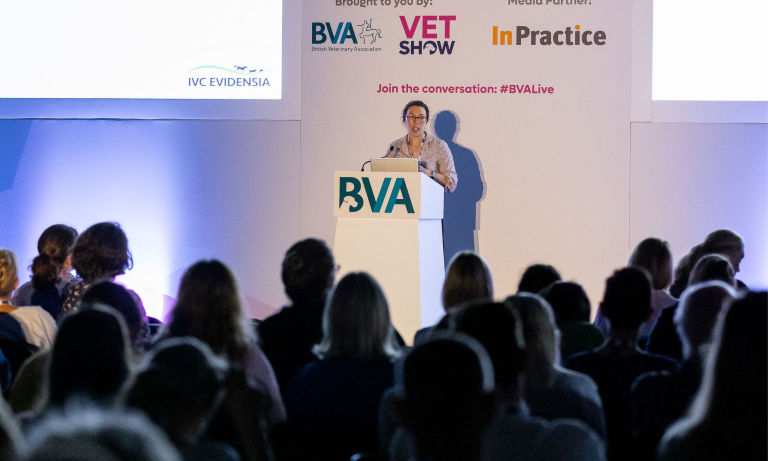Brucella canis: what vets need to know
14 Feb 2024
26 Apr 2023 | Claire Hodgson
What is allyship? In this blog, Claire Hodgson, Co-founder and Director of the British Veterinary Chronic Illness Support, discusses the importance of allyship, how it can help create a workplace where everyone can succeed, and her upcoming BVA Live session.

I am really proud to be representing BVCIS (British Veterinary Chronic Illness Support) and the Spoonie community at BVA Live this year. I’ll be joining the panel to discuss ‘Why active allyship can help create a good veterinary workplace’ and hosting at our Allyship Zone on the exhibition floor, new to the show for 2023. Here, we invite you to learn, share your experiences and pledge your voice for transformation. Listen to powerful narratives of marginalised people in the veterinary world, record your thoughts on allyship and join us for discussions on how we can advance the inclusion for everyone that our professions desperately need.
Allyship as a term was not widely known in the veterinary world until recently. As an industry busy trying to keep our heads above water, we often lack the time to think about wider issues. Yet in teams that succeed and thrive, allyship is something we do without even realising it has a name. It is the time you have a colleague’s back when a client says they don’t want to see the ‘foreign vet’ or when you shut down a conversation critiquing a colleague who always leaves on time because they have caring responsibilities and have a hard stop. It's when you remind the colleague who lives with chronic pain to sit down and take a break, regardless of how busy it is, or when you prompt the person ordering food for a meeting that they need to include something gluten-free for the oft-forgotten coeliac.
On the other hand, evidence in areas from hiring practices to friendship shows that we all make presumptions from our subconscious assumptions. Although people are generally good, bias and discrimination often shows up because we don’t know any better, or have never had cause to examine our underlying beliefs. Aspects like the colour of our skin, our accents and how we match up to social conventions for communication are often matched to stereotypes - stereotypes that are one-dimensional at best and offensive at worst. And then for those with hidden disabilities, caring responsibilities or other unseen challenges, that invisibility can bring its own difficulties. People may simply forget you have additional needs. Worse, they may express openly discriminatory views about groups of people with whom you align. BVA's Voice survey showed 24% of vets had witnessed discrimination but that two thirds of incidence went unreported. This was mainly because individuals didn’t know what to do about it or didn’t think any action would be taken. Allyship gives you the tools to act.
Allyship isn't a title - it is something you do rather than something you are. It is frequently uncomfortable and requires self-reflection and education in order to unlearn harmful behaviours and effectively challenge discriminatory attitudes or practices - whether that be individuals or systems. Committing to being an active ally is not a passive process, it means daily, conscious and consistent actions even when it is personally and professionally inconvenient. We all have to deal with discrimination on a regular basis. Marginalised people don’t get to opt out if it's tricky. Can you commit to show up in support and solidarity even when it’s uncomfortable for you?
Allyship also means amplifying the voices of marginalised people and ensuring they are represented and involved. Look at the meeting you are in and the subject you are discussing - have you got representatives of all those who may be affected in the room? Have you got diversity of thought and experience? Or does everyone come from a similar background, with similar cultural experiences, expectations and goals. You will get a much richer and more robust solution with the former.
Everyone has a duty to perform allyship. Use whatever position and power you have to change hearts and minds, as even in your social group or small teams you can make a difference. If you're in a leadership or senior managerial position, you have even more influence and through positive role modelling, changing policies and procedures and ensuring diversity at all levels, you have the potential to affect large numbers of people.
When we get allyship right, anyone - regardless of socioeconomic background, race, religion, gender identity, sexual orientation, disability or neurodivergence - can walk into your workplace and integrate and belong. When people feel like they belong they can thrive and become ambassadors for your workplace too. If you can get it right for those in marginalised groups, you'll also create equitable environments where everyone benefits - 'good workplaces' where everyone can succeed.
Taking place on 11-12 May at the NEC Birmingham, BVA Live is the place to be to debate and discuss the professions' biggest challenges and topics, to share your thoughts with the BVA Officers, to make new connections, and to take part in high quality CPD to improve your practical knowledge.
Are you a BVA member? Book your ticket now for just £254 +VAT.
Get tailored news in your inbox and online, plus access to our journals, resources and support services, join the BVA.
Join Us Today